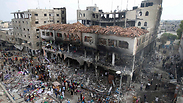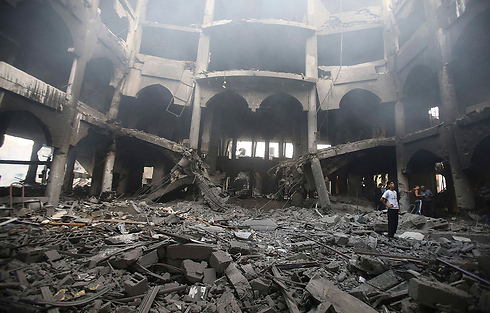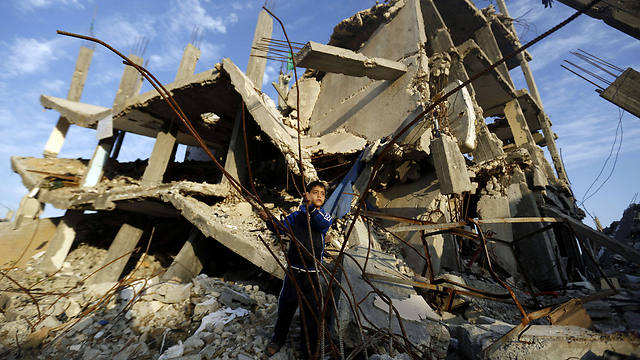
Operation Protective Law
Analysis: Decision yet to be made to open Military Police investigation into so-called Rafah File - one of most controversial incidents in summer's Gaza war which included employment of Hannibal Directive by Givati Brigade Commander Colonel Ofer Vinter.
A decision to open a Military Police investigation into the so-called Rafah File has yet to be made, but the military advocate general (MAG) is already coming under fire from all directions.
Someone is trying to forcibly prevent legal proceedings pertaining to one of the most controversial incidents in Operation Protective Edge – the employment of the Hannibal Directive in Rafah by Givati Brigade commander Colonel Ofer Winter, which involves the massive use of firepower in order to rescue a captured soldier even at risk to his life.
Correction: A Military Police investigation into the incident has already been opened, the probe, however, is focusing on "a serious disciplinary offense," as the army puts it.
Military Police investigators are trying to find out who leaked recordings of some of the brigade's communications during those dramatic moments to Ynet. The screams of Lieutenant Colonel Eli Gino, the commander of Givati's reconnaissance battalion, who ordered one of the forces to hold their heavy assault out of concern for friendly fire casualties, also echo in the case file.
But here we have the recordings in full – and the screams of the battalion commander point to a far more complex story. Leaking selected segments of the recordings was designed to serve a very specific purpose, and conjure up the image of a terrible battle that posed a great risk to our forces. Such an image presses on just the right button in every Israeli and stirs up public opinion against any attempt by the "office rats" at the Kirya to open investigations into the soldiers who sacrificed their lives.

This leak indicates that commanders who played a part in the battle were already gathering evidence at the time, and got their hands on documents and recordings to save for a rainy day. Some have already consulted with attorneys. No one has approached them, and no one has accused them of anything yet but they are already behaving like wanted men and are preparing for the possibility of a legal battle. Apparently they have good reason to be readying for the worst - from their point of view.
On August 1, 2014, some 15 minutes after the ceasefire took effect, a Givati Brigade reconnaissance force that was searching for tunnels ran into an ambush. Three soldiers were killed in the ensuing firefight - recon company commander Major Benaya Sarel, Staff Sergeant Liel Gidoni, and Second Lieutenant Hadar Goldin, whose body was snatched and dragged into a tunnel that led deep into the Gaza Strip.
The moment it emerged that Goldin had disappeared, the Israel Defense Forces launched a series of particularly aggressive military operations designed to pin down the abductors. These operations, which included very heavy fire from the ground and air, led to dozens of casualties among non-combatants in the area.
The considerations of the commanders involved and the firepower employed were at the heart of an internal probe conducted by the army, and the findings are now being reviewed by the military advocate general, Major General Danny Efroni. If he decides that certain elements of the incident require a Military Police investigation, he will consult with the chief of staff and the head of the IDF's Southern Commander (provided he is not implicated in the incident). And even if he decides to open an investigation it could end in a decision not to prosecute anyone.
Shooting from the hospital
An equally problematic incident occurred in Gaza's Shujaiya neighborhood on July 23, when the Israel Air Force attacked and completely destroyed Wafa Hospital, which terrorists were using as cover to fire on Israeli forces. The operational debriefing revealed four air strikes.
Three of them – the ones that actually caused the destruction of the complex – did not come under a Military Police investigation, as the IDF warned of the pending attack in advance, allowed the evacuation of non-combatants and thus adhered to the provisions of international law.
With respect to the first air strike, which was designed to destroy an observation post, the military advocate found that the warning procedures were not implemented in full. Efroni chose, however, to recommend a disciplinary review and not a Military Police investigation. None of the MAG's detractors is familiar with the full picture of what ocurred on August 1, but this is not stopping them from lashing out at him.
All of the soldiers and commanders who took part in the Rafah battle are aware of their own personal experiences. Only two individuals are familiar with the big picture; only they have heard all the testimonies, all the stories, all the recordings, from every possible angle, from the GOC Southern Command down to the last of the privates.
One of them is Major General Noam Tivon, who already after Operation Cast Lead was named head of the team that investigates irregular incidents during combat operations - the other is the MAG.
Tivon's findings on the Rafah incident were submitted to the MAG professionals a few weeks ago, but they were returned to him with additional questions. The file is now back at the MAG's office and it contains some harsh criticism of the performance of the commanders in the battle.
Tivon's investigations team found that 41 Palestinians were killed in the incident, and not 70 or 150 as claimed by the Palestinians. This didn't change his mind with respect to the considerations and discretion exercised by commanders at the time.
Tivon and his team revealed a series of professional oversights that require those involved to go back to military school. The MAG's perspective is different. The Rafah incident is not an example of a straightforward case into which a criminal investigation should be conducted.
We're not dealing with looting or a premeditated decision to deviate from orders and procedures. It raises questions not only regarding the methods employed, but also the "intent." Was the decision to employ such intense firepower free of extraneous considerations? A desire for revenge, for example? If the answer is yes, then we are dealing with a black-flag matter.
After Operation Protective Edge, the MAG received hundreds of complaints from various human rights organizations, including the Red Cross; and Israel cannot afford to ignore them. Unlike in the cases of Operation Cast Lead and Operation Pillar of Defense, all the investigations into irregular incidents during Protective Edge began as a result of complaints filed by external entities and not internal IDF probes.
In one instance, an investigation was launched following a New York Times report about a 17-year-old Palestinian boy who was "adopted" for five days by IDF soldiers who used him as a human shield. The boy says he was sent out to check tunnels and was beaten by the soldiers.
The MAG's Office looked into the story, found there was something to it, and immediately opened an investigation into the matter, with Tivon's team having no part in the decision. The same goes for five complaints about looting.
The MAG also ordered a Military Police investigation into the shooting of a woman who had emerged from behind cover in coordination with Israeli forces but was shot and killed nevertheless. In another incident, the army asked the Palestinians to evacuate by ambulance an autistic boy who had been caught up in the fighting in the area of Khan Younis.
Despite the coordination, the IDF shelled the ambulance and the paramedic was killed. The complaint landed on the MAG's desk; he passed it on to Tivon; and only after the operational debriefing confirmed the facts did he order a Military Police investigation.
Five teams, 100 cases
The problematic nature of the Rafah incident made headlines the moment it occurred. In September, just a few days after the ceasefire, various pundits, former military officials and political elements saw fit to warn of a possible investigation into the incident. They were joined on Thursday by Defense Minister Moshe Ya'alon, who came out against a Military Police investigation.
Now, we aren’t dealing with just another heckler shouting advice on the sidelines, but the man who heads the defense establishment. Such statements put the MAG in an intolerable situation, because any decision he makes now will be seen in Israel and around the world as one that has been made under pressure. Ya'alon's statement was unfortunate, and reeks of populism.
The argument is the same demagogic argument that has been repeated for the past 30 years, since the first intifada: The IDF can't fight with lawyers breathing down its neck; you don't win wars if every officer has to take an attorney to the battlefield.
In the first intifada, then chief of staff Dan Shomron informed a senior legal entity not to prosecute soldiers for acts committed during military operations otherwise entire platoons will refuse to go into battle. It didn't happen then, and it doesn't happen today; yet the same argument is raised anew whenever one of our guys gets himself or the country into trouble.
The argument too that Military Police investigations will undermine operational debriefings because soldiers will be afraid to tell the truth in the debriefings so as not to incriminate themselves has also been resolved within the framework of the law.
The MAG reviews a debriefing, decides if certain elements require the involvement of the Military Police, but he cannot pass on any evidence that may have arisen from the debriefing. If the Military Police investigators do not reveal evidence uncovered in the debriefing, the MAG cannot point them in the right direction, and the case is closed.
Moreover, more than 20 years ago, the High Court of Justice ruled that the state attorney general has seniority over the MAG. The attorney general can order the MAG to open an investigation. If the MAG fails to investigate a problematic combat incident, and Israel comes under international pressure, the investigation will be taken out of the hands of the army and passed on to the State Prosecution.
Because if Israel fails to present a complete and serious case file, the international institutions will open investigations. And then, not only will Israel be dragged through the mud, the MAG's detractors, too, won't be able to leave the country.
Following Protective Edge, Tivon set up five teams to investigate irregular incidents. He heads one of the teams, and the others are headed by reserve officers with the rank of brigadier general or colonel. The MAG passed on around 100 complaints for review, 50 of which have been handled and were returned to the MAG for a decision. Of the 50, the MAG decided to close 10, and another 16 were returned to Tivon for further handling.
Military Police probes have been launched into five of them, including the shooting at the school in Beit Hanoun that was serving as a shelter for refugees, the incident in which the four children were killed on a Gaza beach, and the bombing of a three-story building in Khan Younis that resulted in the death of 27 people.
Another 50 or so incidents are still in the operational debriefing stage; these include complaints relating to a strike on a residential structure in Shujaiya that left 30 people dead and other incidents.
Independent of the chief of staff
In November, the MAG visited Washington, met with US State Department and National Security Council officials, and presented them with the ways in which Israel intends to handle complaints relating to civilian casualties. He did so in an effort to convince the Americans to support Israel when the complaints reach the International Court of Justice in The Hague.
Attempts to prevent the MAG from looking into issues on the international agenda are an expression of dangerous patriotism, since they undermine the independence of the MAG, the IDF's principal tool in its face-off against the international legal system.
To begin with, the IDF is suspected anyway of investigating itself, with the MAG said to be serving as a fig leaf. The Turkel Commission cottoned on to this point of weakness and advised boosting the independence of the MAG by restricting his term in office to six years – a move that would allow him to act independent of the whims of the chief of staff and defense minister.
Take away this independence, and all that remains then is a legal advisor, who serves the needs of his masters and has no standing in the judicial arena, neither in Israel nor abroad.











